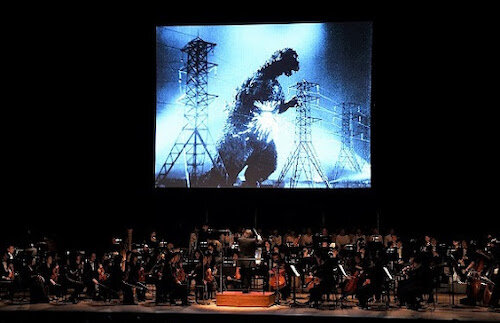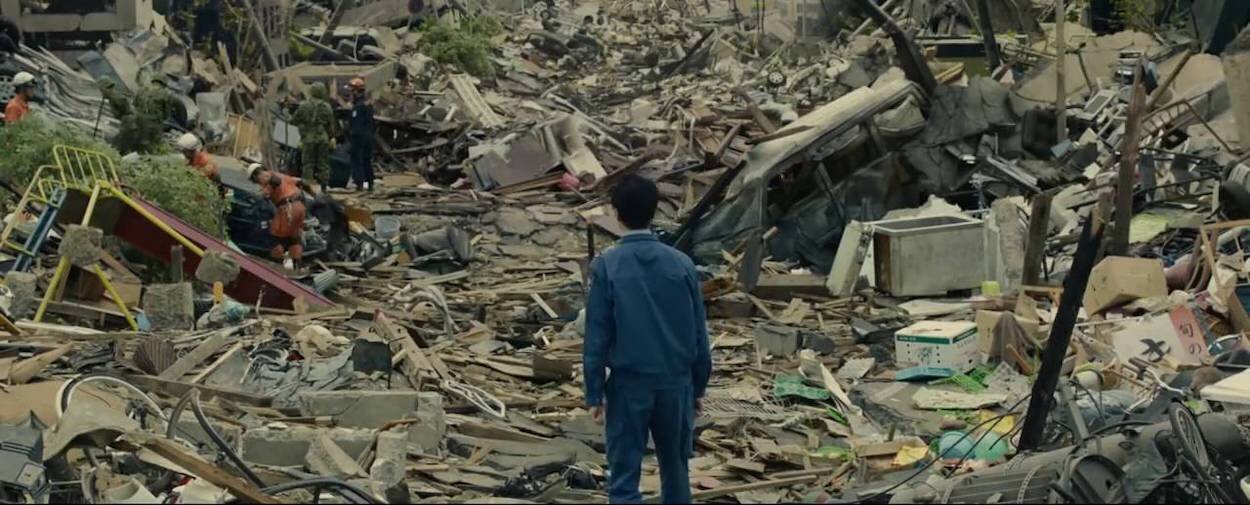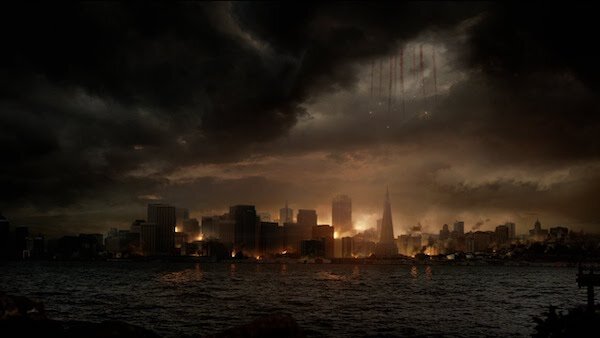Godzilla—King of the Concert Halls
My Mixtape’s A Masterpiece is a weekly feature in which a guest compiles a 12-song playlist around some theme. This week, Kiley Fox assembles 12 epic pieces of classical music fit for the reign of the King Of Monsters.
Born on the silver screen, Kaiju movies set a new precedent for horror, adventure, suspense, and PG carnage. Everything about these Kaiju films was epic: the monsters were big, the casualties high, the effects cutting edge, and the payoff emotional engaging and exhilarating. Kaiju films are a feast for the eyes. But are they also for the ears? Can we tell the story of Godzilla and invoke the same amount of intensity without the moving picture? The answer is “yes”.
While not often the first choice of storytellers, music is a narrative tool. It gives us the sound, forcing us to rely on our own creativity, experiences, and feelings to create the visual in our minds. Unlike the movies, the heart of the tale in a song comes from what we put into it—and my heart belongs to Godzilla. The story of Godzilla in music has taken various forms; most notably, Blue Öyster Cult’s “Godzilla”. I love that song so much it was my walk-up song in softball for years.
Metal and Godzilla seem like a natural match: full of big sound and chaos, rock ‘n’ roll is an instinctive choice for depcting Godzilla. A clear choice, but not necessarily the most appropriate one. Godzilla is a Kaiju of many emotional layers and an intensity hard to cage. To tell Godzilla’s story in music, we need the loudest and most complex band available. We need...the symphony.
Ladies and gentlemen, and everyone in between, may I most respectfully present to you, Godzilla: King of the Concert Halls.
1. “Messa de Requiem: Libera me, Dies irae” by Giuseppe Verdi
One of the prevailing themes of Godzilla and many Kaiju movies is that these monsters are either born of human catastrophe or that they serve as nature’s balance. Verdi’s “Requiem” is a bombastic force of power. Godzilla’s story starts here with the cataclysm that is mankind.
2. “Gymnopédie No. 3” by Erik Satie
We shift from the perspective of the humans to the monster they’ve awoken. Born of melancholy and waking up in an unknown world, “Gymnopedie No. 3” gives listeners a sense of Godzilla’s lonely and quiet existence. In Godzilla’s world, we are the monsters that have disturbed his timeless slumber.
3. “De L’Aube A Midi Sur La Mer” by Claude Debussy
What is destruction if there is not a place in which to destroy. Here Debussy paints a picture of an idyllic and unsuspecting town or city. Life continues on even after tragedy. The music relates the ebb and flow between being both a destructive and peaceful species. This is the parallel between humans and kaiju.
4. “Golliwog’s Cakewalk” by Claude Debussy
Children seem to represent the spiritual life line between kaiju and adult humans. This playful piece is both ornery and innocent. It is open and uninhibited. When I picture children in Toho movies curiously running about, this tune is the spirit in which I hear them. I would like to think Godzilla does too. This is the feeling he wants to preserve in the world.
5. “Raindrop, Preludes, Op. 28: No. 15 in D-Flat Major” by Frédéric Chopin
The first attack is both a surprise and preliminary scouting of the environment. This song presents the transition from an idyllic community to a city in chaos as the raindrops roll in building into a storm. The bittersweet tones in this piece evoke a sad and angry event. It’s as if Godzilla said, “you forced my hand.”
6. “Op. 71-3 Puck” by Edvard Grieg
The shock of the first Godzilla attack leaves people both frightened and confused. The tension builds as they come to realize that this is an entity they don’t know. News and media are in a frenzy. Conspiracy theories are running rampant and no one knows who to trust. This accelerated pace also parallels Godzilla’s growing anger and feelings of despair.
7. “Moonlight Sonata Op.27 No. 2 in C-Sharp Minor” by Ludwig Van Beethoven
There has been a second attack. The reality of massive destruction has set in. The feeling of doom reverberates across the population. Is this monster the harbinger of the apocalypse? And for Godzilla, this piece is his reluctance and pain caused by the changing world around him.
8. “Slavonic Dances, Op. 46:VIII in G Minor” by Antonín Dvořák
Plucky as ever, the humans have come up with a few plans to destroy their Godzilla foe. The contrasting weight between getting hyped up and dancing delicately matches feelings of optimism, motivation, and just maybe the whimsy that this ultimate scheme is from a child’s idea.
9. “Cage: Sonata XIII” by John Tilbury
This piece emphasizes the uncomfortable tension and frail confidence from wondering if the big plan will work. For Godzilla, this piece represents his mysterious existence. He is neither a demon or angel. He lives on a plane in spiritual limbo.
10. “Ride of the Valkyries” by Richard Wagner
While on the nose, this piece is synonymous with war. Much like the Valkyries, listeners can picture planes rising to meet Godzilla. For both the people trying to subdue him, and Godzilla himself, this is the pivotal moment of epic victory or failure. This song is excellent in the way it hits you like tidal waves. This song is timelessly provocative. A quality it shares with Godzilla.
11. “Adagio for Strings” by Samuel Barber
Another piece made famous by a war film. This is one of my favorite compositions of music. While you may visualize the aftermath of a city in ruins. I feel Godzilla’s broken monster heart as he heads back into the sea. Both defeated and weary, this is an elegant and sorrowful retreat. There were no winners here, because whatever caused Godzilla to awaken was the ultimate villain.
12. “The Planets, Op. 32-5 Saturn, The Bringer of Old Age” by Gustav Holst
Listeners can hear the uncertain peace in this song. Nothing is permanent. There are now more questions than answers. This cataclysmic event has aged everyone involved. And as Godzilla returns to his slumber, the world feels more insignificant and mysterious than before. Only time can tell.






